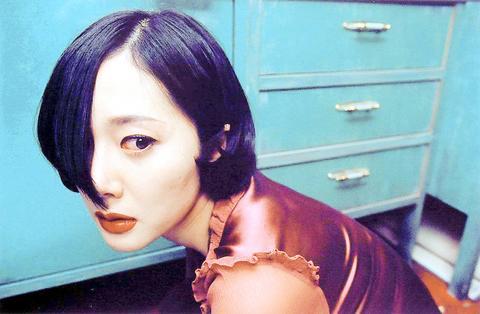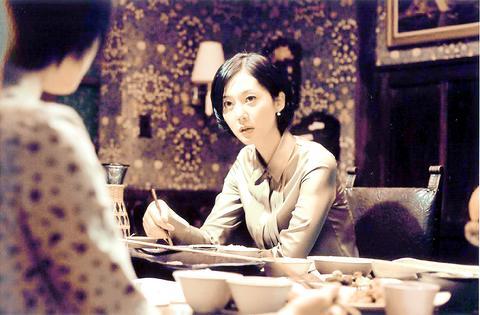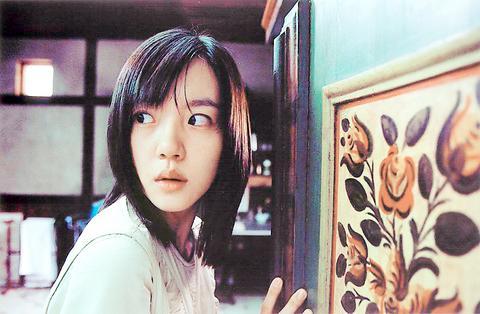Strictly speaking, A Tale of Two Sisters is more of a psycho-thriller than a horror or ghost film. After seeing the film, you cannot help but compare it with The Sixth Sense and The Others.
Director Kim Ji-woon was introduced to Taiwanese audience through his slightly violent comedy, The Foul King (2000), about a frustrated office worker who reveals a violent part of his personality through wrestling. Kim made his second appearance in Taiwan in the three-segment film Three (2002), a Korea-Thai-Hong Kong co-production. Kim directed the first segment Memory.
Those who found his previous efforts less than impressive, will be surprised by Kim's latest work, A Tale of Two Sisters.

PHOTO: FOX
Like Memory and Three, Two Sisters seeks to create a macabre and mysterious atmosphere. The narrative constantly plays mind games, and their are plenty of the usual bag of horror tricks. But this time, the story is richer and much less predictable. Even when you think you've solved the puzzle, new clues appear that entirely change the direction of the story.
Two Sisters tells the story of Su-mi (Lim Su-jeong) and Su-yeon (Mun Geun-yeong), two sisters from a rich family. After their father brings home a new partner, an icy, bewitching young woman (Yeom Jeong-ah), things at home start to go wrong. The girls' natural mother hangs herself in the big closet of the house. The older sister, Su-mi, is hospitalized as a result of excessive grief.
Back from the hospital, Su-mi starts a war against her step-mother. From acts of minor malice, the battle escalates to violence using hands, knives and boiling water. The step-mother is a former colleague of the girls' father and also used to care for their natural mother in hospital when working there as a nurse. These memories also emerge during the confrontation.

As the two sisters try to unravel the truth of their mother's death, the house becomes haunted by ghosts. Images such as floods of blood and a dead body wrapped in thick white cloth, keep rising on the screen. But you never know if these are hallucinations or real happenings. And who is the real ghost? The mother? The step-mother? Or the two sisters?
Director Kim Ji-woon has sought to differentiate his film from The Sixth Sense and The Others through new interpretations and new ways of handling the problems of the genre. "Horror films usually give key answers at the end of the film. But I tried to move ahead, revealing the answers by the middle of the film, but hopefully still keeping the audience interested until the end," Kim said.
For Kim, what is really horrifying is some memory that you want to forget but really cannot get rid off. Bad memories follow the main characters in the film like ghosts. "That is the point I wanted to make," he said.

Another plus is the eerie atmosphere created by the film's outstanding art design. The Korean title means "Roses and Lotuses," a reference to the names of the two girls. The walls of the house are decorated with complex floral patterns, which look classically graceful but also mysterious. On the other hand, the two girls wear simple, monochrome dresses. The lighting and make-up intensify the paleness of all the three women, making them both austere and fragile.
The result is a solid track record for this film. In Korea, the film sets a new box office record, taking 500 million won (US$424,126) in its first weekend. Remake rights have been purchased by DreamWorks for US$1 million.

On April 26, The Lancet published a letter from two doctors at Taichung-based China Medical University Hospital (CMUH) warning that “Taiwan’s Health Care System is on the Brink of Collapse.” The authors said that “Years of policy inaction and mismanagement of resources have led to the National Health Insurance system operating under unsustainable conditions.” The pushback was immediate. Errors in the paper were quickly identified and publicized, to discredit the authors (the hospital apologized). CNA reported that CMUH said the letter described Taiwan in 2021 as having 62 nurses per 10,000 people, when the correct number was 78 nurses per 10,000

As we live longer, our risk of cognitive impairment is increasing. How can we delay the onset of symptoms? Do we have to give up every indulgence or can small changes make a difference? We asked neurologists for tips on how to keep our brains healthy for life. TAKE CARE OF YOUR HEALTH “All of the sensible things that apply to bodily health apply to brain health,” says Suzanne O’Sullivan, a consultant in neurology at the National Hospital for Neurology and Neurosurgery in London, and the author of The Age of Diagnosis. “When you’re 20, you can get away with absolute

May 5 to May 11 What started out as friction between Taiwanese students at Taichung First High School and a Japanese head cook escalated dramatically over the first two weeks of May 1927. It began on April 30 when the cook’s wife knew that lotus starch used in that night’s dinner had rat feces in it, but failed to inform staff until the meal was already prepared. The students believed that her silence was intentional, and filed a complaint. The school’s Japanese administrators sided with the cook’s family, dismissing the students as troublemakers and clamping down on their freedoms — with

As Donald Trump’s executive order in March led to the shuttering of Voice of America (VOA) — the global broadcaster whose roots date back to the fight against Nazi propaganda — he quickly attracted support from figures not used to aligning themselves with any US administration. Trump had ordered the US Agency for Global Media, the federal agency that funds VOA and other groups promoting independent journalism overseas, to be “eliminated to the maximum extent consistent with applicable law.” The decision suddenly halted programming in 49 languages to more than 425 million people. In Moscow, Margarita Simonyan, the hardline editor-in-chief of the